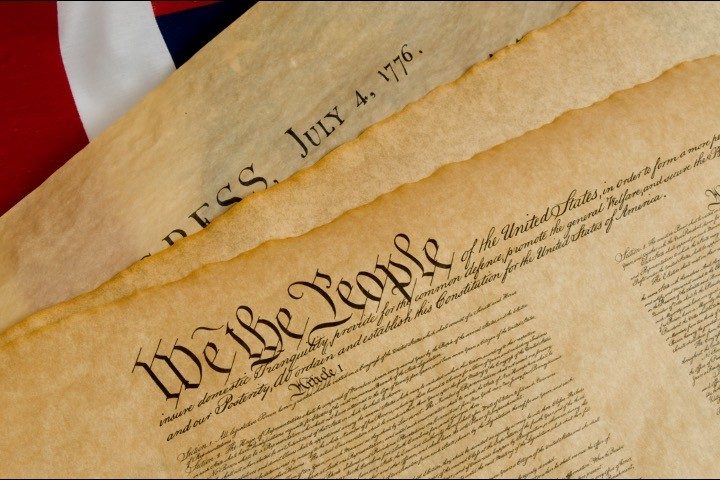
All Bills for raising Revenue shall originate in the House of Representatives; but the Senate may propose or concur with Amendments as on other Bills. — Article I, Section 7, Clause 1 of the U.S. Constitution
On February 13, the U.S. Senate passed a spending bill that would send $95 billion overseas. The bill includes $60 billion for Ukraine. That’s about $7 billion more than will be spent in 2024 on our own Marine Corps!
Apart from the wider issue of the unconstitutionality of all foreign aid, this latest bill is yet another salvo in the never-ending assault on the Constitution, the separation of powers, and the intricate and inspired system of checks and balances meant to impede the accumulation of powers that precedes the permanent establishment of tyranny in any government.
In the engaging prose of Federalist No. 9, Alexander Hamilton praised the practice of legislative checks and balances as a revolutionary safeguard, a beacon of hope signaling that the quest for liberty was far from a lost cause, despite the grim fates of past republics. Hamilton wrote:
The regular distribution of power into distinct departments; the introduction of legislative balances and checks … are means, and powerful means, by which the excellences of republican government may be retained and its imperfections lessened or avoided.
The architects of our Constitution didn’t just break ground; they engineered a masterpiece of republican government where power wasn’t merely scattered among the three departments of the federal government, but was deliberately distributed into a purposeful pattern of balance and restraint. They envisioned Congress not as a monolith but as a dual force, with two chambers reflecting varied interests, terms, dimensions, and roles, thereby establishing distinct spheres of authority and influence into the legislative process.
At the heart of this visionary design lies the Constitution’s deliberate channeling of the power to tax — the lifeblood of governance — directly to the House of Representatives. This decision placed the reins of fiscal responsibility in the hands of those elected officials closest to the electorate, a move both bold and profound.
However, the journey from parchment to practice has been less than perfect. The Senate, wielding its amendment powers with a heavy hand, has often reshaped, even entirely overhauled, revenue legislation birthed in the House, blurring the lines of this constitutional demarcation.
This practice casts a shadow on the unique privilege the House was meant to wield, a privilege that now calls for a renewed vigilance and zeal among its members to reclaim and protect. It’s time for the House of Representatives to stand firm, to champion this exclusive right with fervor, ensuring that the visionary framework etched by our Founders is honored not just in letter, but in spirit.
Echoing the time-honored British tradition that all money matters must kick off in the House of Commons, the brilliant minds behind the U.S. Constitution were adamant: the Origination Clause was their way of ensuring that the “power over the purse” would rest firmly with the legislative body most intimately connected to the American populace. Amid the shortcomings of the Articles of Confederation, where the general government’s hands were tied from taxing individuals directly, this clause emerged as a cornerstone, designed to carefully frame the newfound powers of revenue under the Constitution.
Moreover, this clause was a linchpin in the grand bargain that calmed the tempest of dissatisfaction among the larger states, aggrieved by the equal representation in the Senate. By placing the authority to originate tax legislation in the House of Representatives, where populous states wielded more clout, a delicate balance was struck.
Yet, the clause that made its way into the final document was a shadow of the robust version championed by Elbridge Gerry of Massachusetts. Gerry had envisioned a clause that would mandate all “money bills” (encompassing appropriations) to take their first breath in the House. He warned that the Senate could morph into an aristocracy, one that would dominate the House and set sophisticated legislative snares for the members of the House of Representatives, preventing them from actually representing the people. Gerry stood firm in his belief that “It was a maxim that the people ought to hold the purse-strings.”
This view, however, faced stiff opposition from those who favored a strong central government. James Wilson of Pennsylvania dismissed the fuss over the clause at the Constitutional Convention with a pragmatist’s shrug, arguing that the sequence of approval between the branches was trivial compared to the act of consent itself.
During debate on Gerry’s proposal, Charles Pinckney of South Carolina opposed the measure, relating the experience of his state, in which the Senate could not originate spending bills.
“The practice has been a source of pernicious disputes between the two branches; moreover, it was evaded by the Senate’s handing amendments, informally, to the House.”
This is precisely the legislative legerdemain that is practiced in Congress today. The House of Representatives offers legislation, then the Senate’s sleight of hand makes the House’s bill disappear. Taking advantage of the procedural misdirection, the Senate amends the House’s bill, but in truth the bill is amended out of existence and what appears out of the puff of smoke is an entirely new bill, cut out of whole cloth by the Senate. This is the way the 18th-century South Carolina Senate got around the prohibition on originating spending bills, and that’s the way the 21st-century U.S. Senate gets around the U.S. Constitution’s similar separation of powers.
At the convention of 1787, the outcome was a compromise tilted more toward Wilson’s perspective than Gerry’s, narrowing the clause’s scope to revenue-raising bills and endowing the Senate with the power to amend — a move many delegates believed stripped the clause of any substantive power. Ultimately, the measure as it is now enshrined in Article I narrowly passed, five states in favor, four states opposed, with Massachusetts divided.
Despite its dilution, the Origination Clause retained its significance. James Madison, who was lukewarm about the clause during the Convention, later cast it in a favorable light in Federalist No. 58. He proclaimed:
The House of Representatives cannot only refuse, but they alone can propose the supplies requisite for the support of the government…. This power over the purse may, in fact, be regarded as the most complete and effectual weapon with which any constitution can arm the immediate representatives of the people, for obtaining a redress of every grievance, and for carrying into effect, every just and salutary measure.
In this light, then, the Origination Clause exists not as an irrelevant relic of compromise, but as a testament to the enduring principle that those elected directly by the people should have the primary say in the how the people’s money is spent.
In a twist that won’t surprise the cynical, the Origination Clause has largely been a “parchment barrier” in the Constitution’s intended protection of liberty and from tyranny. In fact, the blueprint of federal budgets, including most revenue bills, isn’t drawn up in the either hall of Congress, but rather in the byzantine bureaucratic corridors of the Treasury Department. Our federal union of republics is being allowed to disintegrate through disregard into an oligarchy of executive-department despots.
Additionally, the apprehensions voiced by Elbridge Gerry have proven prophetic. The Senate wields its amending powers like a legislative chain saw, demonstrating time and again that it can and will gut a House-originated bill and and fill that space with a spending bill of its own creation, essentially rendering the Origination Clause nothing more than a ceremonial gesture, a deplorable demotion that has been the fate of so many key constitutional checks on despotism.
This is the perversion of a central constitutional principle — separation of powers — that leads to $95.3 billion foreign aid bills passed 70-29 by the U.S. Senate, with the Speaker of the House declaring that he doesn’t plan to bring the bill to a vote in the House of Representatives.
It should be evident, then, after this brief recitation of constitutional history, that such a bill, first, should not exist, as there is no constitutional grant of authority to spend the people’s money on foreign aid; and second, should not start in the Senate, with the House promising not to vote on it. Such disregard and disdain of the novel structure and intended function of our sacred charter should not go unnoticed and unpunished, as it is now and has been for a century.
Until the American people hold their federal representatives accountable for acquiescing in the Senate’s seizure of spending power, the upper chamber will carry on drafting legislation that violates the Origination Clause, spends billions on protecting foreign borders — while leaving our own porous and unprotected — and takes the power of the purse out of the hands of the representatives of the people.




